Mourning the Prophet's demise: a day of remembrance and grief

TEHRAN- Today, the 28th day of Safar, the second lunar month, marks a somber occasion in the Islamic calendar. Muslims around the world are mourning the passing of the Prophet Muhammad (PBUH), the final messenger of God, and the martyrdom of Imam Hassan (AS), his grandchild and the second Imam of Shia.
The Prophet Muhammad (PBUH) led the Muslim community through a challenging period, guiding them from persecution to victory. His teachings, centered on monotheism and ethical conduct, have shaped the lives of billions. The loss of such a guiding figure was profound, and his departure is remembered with deep sorrow.
The martyrdom of Imam Hassan (AS) adds another layer of grief to this day. He was known for his peaceful approach and dedication to justice. His sacrifice serves as a reminder of the ongoing struggle for righteousness.
On this day, Muslims in Iran and around the world are engaging in rituals of mourning, demonstrating their profound respect and love for the Prophet and the Imams. This day stands as a poignant reminder of the significance of faith, compassion, and the pursuit of justice amid adversity.
Iranians in various provinces across the country, as well as in communities abroad, are holding numerous mourning ceremonies to commemorate this occasion.
The Prophet Muhammad (PBUH)’s life and teachings inspire people to strive for a better world, one guided by compassion, understanding, and the pursuit of justice.
The Prophet Muhammad (PBUH), born in the year 570 BC in Mecca, was a remarkable leader, navigating both times of peace and war with wisdom and courage. His teachings, encompassing a comprehensive message of monotheism and ethical conduct, have shaped the lives of billions.
His life was a testament to the principles of unwavering faith, resilience in the face of hardship, and the importance of building a just and equitable society. His passing marks the end of an era, yet his message continues to resonate through the ages.
His early life, shaped by the loss of his father prior to his birth, found him nurtured by his grandfather and uncle within the humble yet respectful confines of the Quraysh tribe, known for its significant role in the commerce and politics of Mecca. As a young man, he honed his commercial acumen through extensive travels as a caravan trader, earning the esteemed title of “al-Amin,” or the trustworthy, for his integrity.
In his twenties, Muhammad (PBUH) entered a union with Khadijah, a successful businesswoman older than him, marking the beginning of a profound partnership that blessed them with several children, including Fatima, who would later marry Ali ibn Abi Talib, destined to be Muhammad's successor. The early stage of his prophetic mission attracted followers, yet it was not without resistance. His condemnation of idolatry posed a direct threat to the established economic structures upheld by Mecca's tribal elites, leading to escalating tensions.
In the year 622, following mounting opposition, Muhammad and his followers migrated to Medina, an event that signified the genesis of the Islamic calendar. There, he played a crucial role in uniting local tribes, fostering a burgeoning Muslim community that would navigate the trials of survival in a series of significant confrontations between 624 and 628. Triumph in the Battle of the Trench and subsequent engagements markedly shifted the power dynamics, culminating in the peaceful entry into Mecca in 630, during which many adversaries were granted amnesty, facilitating the widespread acceptance of Islam.
After settling the conflict with Mecca, Muhammad undertook his inaugural pilgrimage and delivered his final sermon atop Mount Arafat in 632. Shortly thereafter, he fell ill and passed away on Safar 28, a date that resonates with deep reflection among Muslims. In his final moments, he imparted a farewell address, preaching unity and kindness among his followers and addressing any grievances directly.
Legend has it that Imam Ali (AS), along with companions, performed the sacred rites of washing, shrouding, and burying the Prophet (PBUH), laying him to rest in his home, which has since evolved into Masjid al-Nabi, a revered place of worship. This day stands as a profound reminder of the enduring legacy of the Prophet Muhammad (PBUH) and Imam Hassan (AS), as Muslims collectively honor their memory through reflection and observance.
SAB/
Leave a Comment